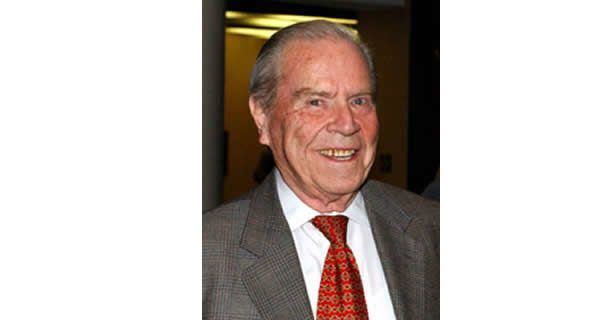Rhodes legacy lives on at ASU through Honors College chair, congressional papers
Members of the ASU community this week are remembering the legacy of longtime Arizona congressman John J. Rhodes Jr. who died from cancer Aug. 24 at his home in Mesa.
Rhodes, the first Arizona Republican elected to the House, served in Congress for 30 years, rising to the post of House Minority Leader. He is perhaps best known for his role in President Richard Nixon's resignation in 1974 after the Watergate scandal. Rhodes, a longtime Nixon supporter, along with Arizona Senator Barry Goldwater and another senator, went to the White House to convince Nixon he would not survive an impeachment vote. Nixon resigned two days later.
Among his many water-related interests in the state, Rhodes was one of the key congressional advocates of federal funding for the Central Arizona Project (CAP), bringing Colorado River water to central Arizona.
At ASU, the most visible legacy is that of the John J. Rhodes Chair in Public Policy and American Institutions and the annual Rhodes Lecture in the Barrett Honors College.
"John Rhodes' exemplary career and commitment to public service are a guiding light that will continue to shine and impact ASU students for many generations to come," says Mark Jacobs, dean of the Barrett Honors College at ASU. "The Rhodes chair will continue to represent the civic values to which John Rhodes' career was dedicated."
The endowment allows the college to introduce the examination of public policy and American citizenship, as well as discussion of the country's place in the world culture, into the Honors College curriculum.
Jacobs says it also allows the college to annually add a nationally known faculty member that might not otherwise come to ASU. Since its establishment in 1998, the Rhodes chair has been held by former Secretary of State and statesman Henry Kissinger, former U.S. Senator Alan Simpson, scientist and Pulitzer Prize winner Jonathan Weiner, renowned Native American scholar Donald Fixico and noted biographer Jean Strouse.
Once on campus, the chairholder interacts closely with the students, through both a special lecture class and other presentations, including the annual Rhodes Lecture, which is open to the public. With the chairholder being at ASU throughout much of a semester, it also provides opportunities for interactions with faculty members throughout ASU.
"There aren't that many endowed visiting chairs of this nature at any institution," says Jacobs. "To have one of this magnitude at the Honors College is tremendous. It really allows our students to delve into the topic, in a way they wouldn't otherwise be able to."
While the endowed chair and lecture offer opportunities to future generations of students, a collection in the University Libraries Arizona Collection offers an extensive look at Rhodes' past work.
ASU Archivist Rob Spindler says the John J. Rhodes collection, housed in Hayden Library, is the university's second-largest political collection next to that of Senator Carl Hayden. Four hundred boxes and more than 2,000 photographs encompass Rhodes' entire career, including extensive material on his Arizona water-issue work and political leadership, including Watergate.
The collection also includes material related to Rhodes' run for Arizona governor in 1988. The campaign was part of a recall effort against Even Mecham, but was cancelled when Mecham was impeached.
"It is an important collection," says Spindler. "It is used by scholars here at the university, throughout the state and really throughout the country."
Spindler says the Arizona Collection staff were recently working with Rhodes on a new project, a collection of essays by Rhodes on a variety of current topics to be published on the Internet this fall. The essays cover relevant topics such as water issues, alternative energy sources and foreign and Middle East policy. Spindler says a Rhodes' essay on his recollections of the Watergate scandal also will be republished.
"It is a very enlightening and relevant collection of essays," says Spindler. "We should have it available this fall; unfortunately it will have to be published posthumously."


